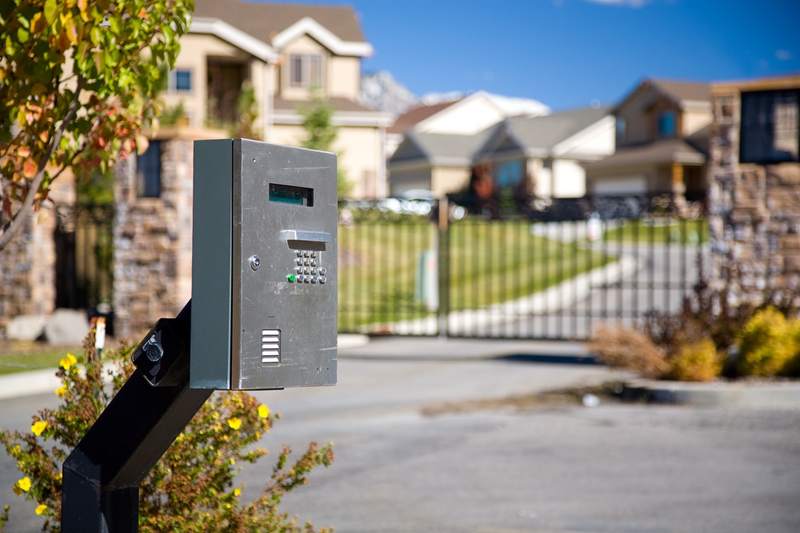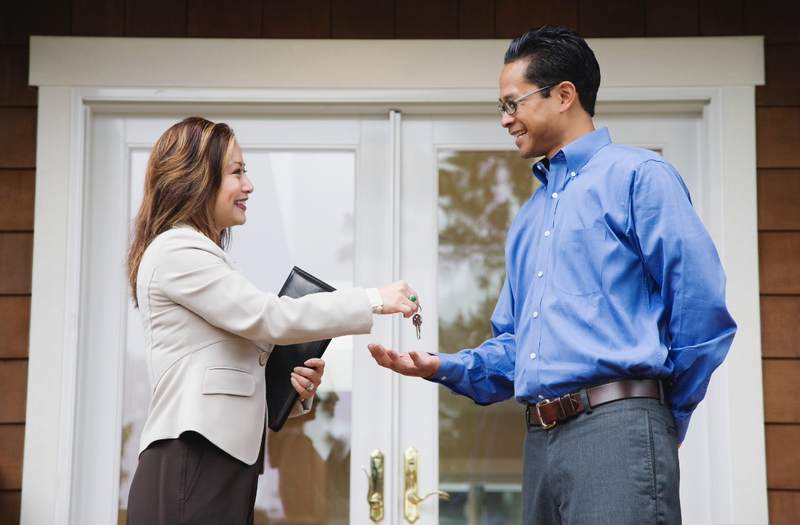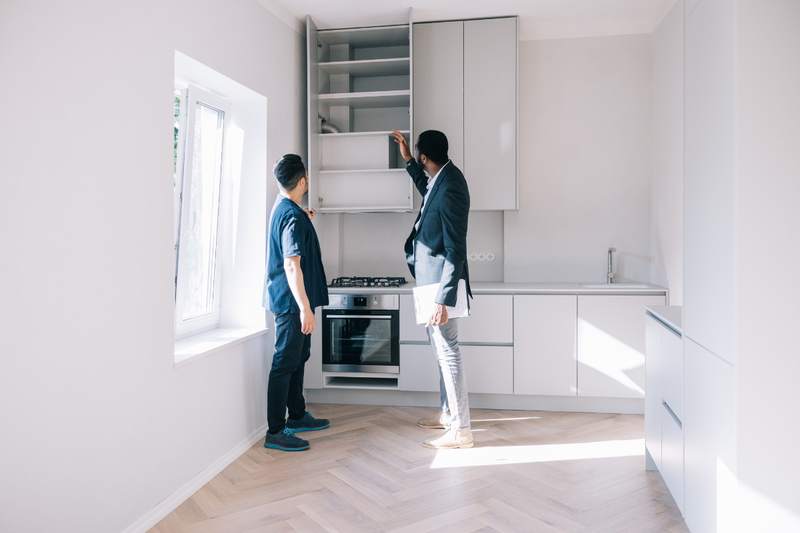As the name implies, a gated community is a private residential area that uses fences and gates to separate it from the surrounding town or city.
Some people find the benefits of living in a gated community appealing. However, there are important drawbacks to consider before you choose to buy a home in one.
Key Takeaways:
- There has been a long history of gated communities, going back millenia.
- The benefits of gated communities include more privacy and access to amenities.
- The drawbacks of gated communities include additional fees and difficulties with guest access.
What Is a Gated Community?
A gated community is a residential area that is separated from the rest of a neighborhood, town, or city using fences and gates. It serves as an enclosed neighborhood of its own, often with amenities such as parks or pools.
Gated communities tend to restrict access, allowing only residents and invited guests through the gates. People who don’t live in the community or aren’t invited cannot enter.
What do gated communities have?
For the most part, gated communities focus on residential properties and amenities for the people who live there. These properties often include single-family homes, townhouses, or condos, but vary depending on the gated community. Common amenities include parks, fitness centers, and recreational facilities like tennis courts, pools, or golf courses.
What does a gated community not have?
Gated communities are residential neighborhoods, so they don’t have commercial businesses like restaurants or stores. They also don’t have schools. Residents must exit the gated community to access these things.
History of Gated Communities
The history of gated communities goes back millennia. People have long built gates and walls around cities to keep out invaders and other outgroups. The first gated communities arrived in the Americas with the creation of Spanish fort towns in the Caribbean.
The first purely residential gated communities started appearing in areas like New York and St. Louis in the second half of the 19th century, when wealthy homeowners insulated themselves during a period of rapid urbanization.
Gated communities transitioned from rarities to commonplace in the late 1960s and early 1970s. By 1997, as many as 20,000 gated communities with 3 million homes existed. Once exclusively for the wealthy, gated communities now target retirees, country clubs, resorts, and middle-class suburbs.
Pros of Living In a Gated Community
People choose to live in gated communities for many reasons. There are perks to living in an area that is closed off and secure.
More privacy
One main benefit of a gated community is increased privacy due to less foot traffic from strangers. This is especially appealing to celebrities and other famous people, which has led to the rise of well-known communities such as Hidden Hills in Los Angeles.
Access to amenities
Many gated communities provide amenities for their residents to enjoy.
“Luxurious facilities are standard in gated communities,” says Joy Aumann, a Realtor and founder of Luxury SoCal Realty, a La Jolla, California-based real estate company. “Neighborhoods include swimming pools, gyms, tennis courts, golf courses, and community centers. Homeowners can enjoy manicured common spaces, walking trails, and other recreational amenities.”
Regular upkeep
Gated communities usually come with homeowners associations, which require homeowners to maintain their properties to keep them in good condition. HOAs also provide upkeep of common areas by hiring landscapers, cleaners, and other workers to ensure that the community remains aesthetically pleasing.
Less traffic
Gated communities limit access to their roads. Limited access means less traffic, which can also translate to a safer environment for younger children or pets.
Less noise
In part due to the decreased traffic, gated communities have less noise pollution. They also often have noise regulations enforced by their HOAs.
Safety
Gated communities have a reputation for safety because of their restricted access. Many also hire 24/7 security to help protect residents. Research has shown that gated communities tend to have a lower risk for opportunistic crimes and burglaries.
High home values
Gated communities tend to see higher home values. A 2016 study, for example, found that homes in gated communities tend to be worth $30,000 more on average than other properties.
Sense of community
People who live in gated communities may feel a greater sense of belonging or community with their neighbors. This is especially true if the community has amenities like parks or pools and frequently runs events.
More parking options
Most gated communities have a greater amount of available parking because only residents and their guests are allowed to park in the area.
Cons of Living In a Gated Community
Gated communities have a lot of benefits, but it’s important to know their drawbacks as well.
Harder for guests to access
If you have guests who want to visit, they’ll need to take extra steps to gain access to your gated community, which adds effort to having people over. Depending on the community, your guests may need to visit during specific hours, you might have to provide an entry code, or you may need to give the gate attendant a list of names.
Harder for you to access
In a typical neighborhood, you can usually approach your home from multiple directions. Gated communities often only have one or two points of entry for the whole community, forcing you to drive around the walls to get to an entry point.
You also need a special way to get through the gates, such as a physical key, radio-frequency identification card, or keypad code that you enter.
More costly
Though high property values can be a benefit if you’re already a homeowner, it can mean greater costs to buy a home if you’re looking to purchase in a gated community. Depending on the rules of the HOA, you may also pay more for landscaping and home maintenance.
HOA restrictions
Gated communities come with HOAs that provide various services but also place restrictions on what homeowners can do with their properties. You must abide by these rules or face fines.
Common HOA rules include:
- Limiting the colors you can paint your home.
- Restricting lawn decorations.
- Noise restrictions.
- Parking rules and restrictions.
- Pet restrictions.
- Trash and recycling rules.
- Limits on short-term rentals.
- Home occupancy limits.
HOA fees
HOAs charge regular fees to cover the costs of maintaining the neighborhood and amenities. The average HOA fee is $259 per month, but gated communities often have higher fees to pay for security and the more extravagant amenities they might provide.
Delivery problems
If you frequently get packages, food, or groceries delivered, it can be harder for delivery drivers to access a gated community. The drivers may leave packages at your community’s front gate or another inconvenient location, and you may have to provide special instructions for every delivery.
Less freedom to make home improvements
Because of HOA rules, you might be limited in terms of the home improvements you can make. For example, your HOA might not allow you to add a mother-in-law suite.
Delayed emergency services
Due to the limited number of entry points into the community — plus the process of getting through the gate — emergency services might not be able to respond to calls as quickly if they need to get to a home in a gated community.
Gated communities still experience crime
Gated communities offer a sense of safety, but people living in them still experience crime. That sense of safety can lead to taking fewer precautions, like leaving doors unlocked.
In some cases, living in a gated community can make you more of a target, due to the perception that you have more things worth stealing.
People living in gated communities may also be at greater risk for some crimes, such as intimate partner violence or bullying, because the victim is essentially locked in the community with the offender.
Summary: Pros and Cons of Living In a Gated Community
Before buying in a gated community, consider both the pros and cons.
Pros and Cons of Gated Communities
| Pros | Cons |
| More privacy. | Harder for guests to access. |
| Access to amenities. | Harder for the homeowner to access. |
| Regular upkeep. | More costly. |
| Less traffic. | HOA restrictions. |
| Less noise. | HOA fees. |
| Safety. | Delivery problems. |
| High home values. | Less freedom to make home improvements. |
| Sense of community. | Delayed emergency services. |
| More parking options. | Gated communities still experience crime. |
Should You Buy a Home in a Gated Community?
Whether you should buy a home in a gated community depends on a lot of factors. Gated communities are great for some people and a poor choice for others.
For example, if you value freedom in how you can use your home and make changes to it, a gated community might not be right for you due to potentially restrictive HOA rules. Gated communities also aren’t a great choice for people who frequently entertain guests or want to buy a less expensive home.
On the other hand, people who value privacy as well as the neighborhood uniformity and amenities that HOAs provide might enjoy living in a gated community.
Gated Community FAQ
Before buying a home in a gated community, it’s important to understand the details of how they work.
The U.S. Postal Service delivers mail to gated communities, but there can be issues that delay or prevent delivery. Some communities may have mailboxes or parcel lockers near the front gate.
Yes, all gated communities are part of an HOA. The HOA maintains the area and pays people to staff the gates.
The Bottom Line on Gated Communities
Gated communities offer valuable privacy and amenities to their residents but can come with drawbacks. Living in one can cost more, and you’ll have limits on how you may use your home. Think about what you’re looking for in a home and neighborhood to help you make the right decision about buying in a gated community.






